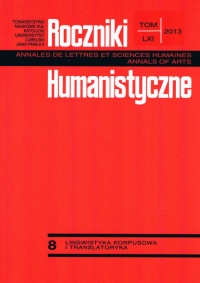Testament: Entity—Concept—French and Polish Terms in their Multidimensional Relations
Abstract
The aim of this article is to present a method of terms analysis based on realistic metaphysics. Its application is necessary to determine the equivalents of the term will in comparable texts taken from the French and Polish Civil Code. These terms are presented integrally, i.e. in their relationships between ontic structure of the called being, ontological structure as well as morphological and syntactic structure of the language. The author extracts the terms from the documents using a real terminological definition and presents them in their syntagmatic combinatorics on the metalinguistic level in the form of source sentences. It forms the basis for a description of French and Polish collocations and compound terms as some units of the discourse in comparable texts. The author also contrasts them with the terms from bilingual dictionary and presents some difficulties to determine the equivalents. The type of specialized text and its historical context should also be taken into consideration.
References
Depecker Loïc, 2003, Entre signe et concept : éléments de terminologie générale, Paris, Presses Sorbonne Nouvelle. (Réimpression 2009).
Depecker Loïc, 2005, « Contribution de la terminologie à la linguistique », Langages, n° 157, 6–13.
Gilson Etienne, 1969, Linguistique et philosophie. Essais sur les constantes philosophiques du langage, Paris, Vrin.
Harris Zellig Sabbetaï, 1988, Language and Information, New York, Columbia University Press; trad. fr. Ibrahim (A.H.) et Martinot (C.), La langue et l’information, 2007, Paris, Cellule de recherche en linguistique, crl.exen.fr.
Kleiber Georges, 1999, Problèmes de sémantique. La polysémie en question, Villeneuve, Presses Universitaires du Septentrion.
Krąpiec Mieczysław Albert, 1995, Język i świat realny, Lublin, Wyd. KUL.
Lerat Pierre, 1995, Les langues spécialisées. Paris, PUF.
Lerat Pierre, 2008a, « Terminologie et ontologie juridiques. A propos du contrat de crédit lié en droit communautaire », Studi italiani di linguistica teorica e applicata, XXXVII-2, 327–343.
Lerat Pierre, 2008b, « Texte spécialisé et terminologie » Intralinea (www.intralinea.org/print/ article1732).
Lerat Pierre, 2010, « Variabilité et harmonisation terminologique » ; Publifarum (n° 12, Atti Convegno Assiterm 2009, www.publifarum.farum.it).
Martin Robert, 2001, Sémantique et automate, Paris, PUF.
Parla Marta, 2013, La terminologie française et polonaise du droit des successions, Mémoire de maîtrise, Lublin, KUL.
Śliwa Dorota, 2011a, « Cœur et sentiments: une étude cognitive des collocations françaises et polonaises » [in :] A. Krzyżanowska, R. Jakubczuk (dir.), Parler des émotions : entre langue et litterature, Lublin, Wyd. UMCS, 191–199.
Śliwa Dorota, 2011b, « Les inférences à fondement lexical – pour une dimension ontologique de la sémantique lexicale », [in :] Actes du Colloque « La ‘logique’ du sens : de la sémantique à la lexicographie : débat critique autour des propositions de Robert Martin », Metz, Recherches Linguistiques 32, 229–238.
Śliwa Dorota, 2013, Formation des noms et des termes composés français et polonais : de la cognition à la traduction, Lublin, TN KUL.
Temmermann Rita, 1999, « Why traditional terminology theory impedes a realistic description of categories and terms in the life sciences», [in :] Terminology, vol.5, n. 1, 77-92,
Temmermann Rita, 2000, « Une théorie réaliste de la terminologie: le sociocognitivisme », [in :] Terminologies Nouvelles, vol. 21, 58–64.
Copyright (c) 2013 Roczniki Humanistyczne

This work is licensed under a Creative Commons Attribution-NonCommercial-NoDerivatives 4.0 International License.





